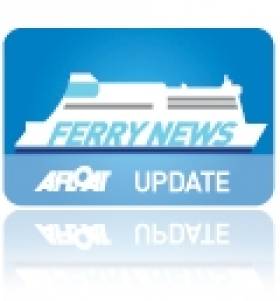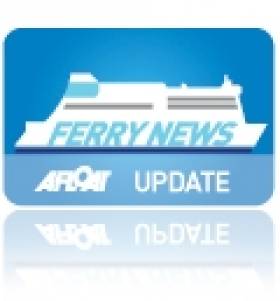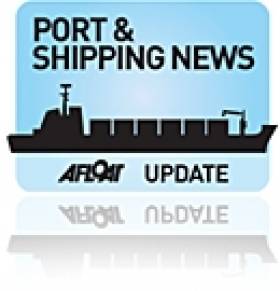Displaying items by tag: St. Patrick's Day
Euro-Celtic Countdown! as Gathering Looms Over the Horizon
#GatheringVoyage- Passengers booked on a Celtic Link Ferries sailing from France one month from today (15 March) in advance of St. Patrick's Day, will be taking advantage of a special €1 euro 'Gathering' fare, writes Jehan Ashmore.
The special offer was an initiative by CLF in this year-long Gathering of events and next month's National Day of festivities.
Celtic Horizon operates three round-trip sailings weekly and among the 27,522 tonnes ro-pax facilities are the Cherbourg Café, Tuskar Lounge and Rosslare Bar. In addition there are a choice of cabin accommodation for the overnight 17-hour crossing between Normandy and Wexford.
Rory McCall, passenger sales manager said "Celtic Link Ferries will ensure that passengers get great value crossings to and from France all year long in 2013. It is only fitting that we give our passengers the best value deal ever between France and Ireland on 15 March".
This month CLF celebrate their eighth year in service, having taken over the route in 2005, following the closure of the service the previous year run by P&O Ferries.
National Ferry Fortnight Launched
#FERRY FORTNIGHT – With today's St. Patrick's Day festivities, the national event also coincides with the launch of our nearest neighbour's National Ferry Fortnight (17th-30th March) campaign held in the UK, writes Jehan Ashmore.
Each year around 13m people travelled between the UK and Ireland while more than 10m people took to the skies.
The UK has an extensive ferry network of approximately 50 routes including those serving the islands. Of the 11 shipping operators that are members of the Passenger Shipping Association (PSA), five of them serve on routes to Ireland.
Those participating in the ferry campaign which operate on the Irish market are Brittany Ferries, Irish Ferries, Isle of Man Steam Packet Company, P&O and Stena Line.
To read more about all the ferry firms participating in the National Ferry Fortnight campaign click HERE.
Lee Looks Ahead to All Antarès Arrival
A trio of French Naval mine-route survey craft are to sail upriver of the River Lee this Friday and are to berth in the Port of Cork at the North Custom House Quay, writes Jehan Ashmore.
The craft BRS Antarès (M 770), BRS Altaïr (M 771) and BRS Aldébaran (M 772) represent all of the three-ship Antarès-class which are based in the Breton naval base of Brest. At 28m long the rather stout-looking craft (photo) weigh some 250 tonnes displacement and have a crew of 23.
Leadship of the class BRS Antarès entered service in 1993 and was followed by the remaining pair which too were built by Chantier (Socarenam) in Boulogne-sur-Mer.
In March the BRS Altaïr accompanied the minehunter CMT Cassiopée (M642) to Dublin for a four-day visit during the St. Patrick's Day festival.
French Navy to Visit Dublin's St. Patrick's Festival
CMT Cassiopée is a 'Tripartite' class minehunter built for the navies of France, Belgium and The Netherlands. The class were conceived in the 1970's and built during the following decade. The French built the mine-hunting equipment, the Belgians provided the electronics and the Dutch constructed the propulsion unit.
Displacing 615 tonnes, Cassiopée (see photo) was built by the Direction des Constructions Navales (DCN) shipyard in Lorient and entered service in 1984. The 51.5m minehunter has a crew of 49. Over the years several of the Tripartite class were sold to the navies of Bulgaria, Indonesia, Latvia and Pakistan.
In January 2009 the Cassiopée was joined by the L.E. Emer (P21) in Bantry Bay to commemmorate the 30th anniversary of the Whiddy Island Oil Refinery disaster and the sinking of the French supertanker the Bételgeuse.
Like the Cassiopée the minehunter BRS Altaïr (M771) was also built in 1984 but at the Chantier (Socarenam) shipyard at Boulogne-sur-Mer. At 28m long the craft (photo) is one of the three Antar class which has a 250 tonnes displacement and a crew of 23.
The French Naval call to the capital was to coincide with a visiting task force group from the German Navy. The task force of two frigates and a support ship were due to visit at the weekend but this was cancelled due to humanitarian relief operations off Libya. To read more about this and the task force vessels click here.



























































